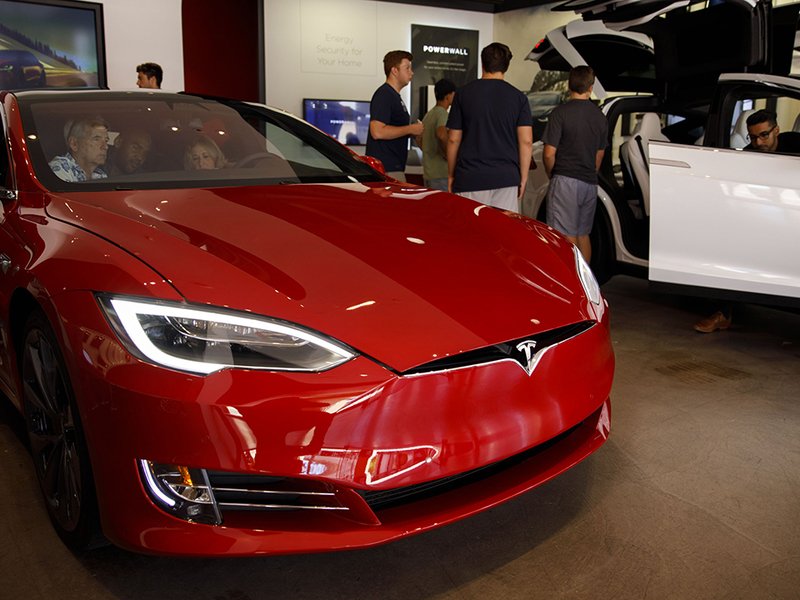
LAS VEGAS — A bipartisan group of Colorado lawmakers, in a move that sparked swift pushback from the state’s new-car dealers, has introduced a bill that would allow automakers to sell electric vehicles directly to consumers.
The measure, introduced Thursday in the state assembly, would create an exception to Colorado law that would allow automakers to directly own, operate or control dealerships that sell their own electric vehicles. A Senate hearing on the issue is scheduled for Tuesday.
“We believe the franchise [model is] better for the industry, better for the factory and better for the consumer,” Tim Jackson, president of the Colorado Automobile Dealers Association, told Automotive News, adding that he anticipates franchised dealers will oppose the measure. “The dealer is in the middle of that process to take care of the customer locally.”
State Sens. Chris Hansen, a Democrat, and Kevin Priola, a Republican, along with Democratic state House Speaker KC Becker, are sponsoring the bill, which defines an EV as “a motor vehicle that can operate entirely on electrical power.”
Hansen said this bill marks a second attempt after a similar measure he introduced last year failed on the House floor.
The main difference this time, he added, is that the legislation would allow any automaker that builds electric vehicles to sell them directly. The previous effort would have limited it to EV-exclusive manufacturers.
“I really felt like we needed to have parity for all EV manufacturers, and that’s really the purpose of the bill,” said Hansen, whose district includes part of Denver.
“It’s not a bill about trying to take something away from dealerships.”
Michael Dunlap, vice president of business development for Schomp Automotive Group, which has six dealerships in Colorado, said he’s “tremendously concerned” about the Colorado bill.
“When we can be there and take care of the consumer and react to their needs on an individual basis, that model serves a consumer much better,” he said.
The debate over direct EV sales cuts through traditional partisan politics, with free-market conservatives aligned with green-car supporters. Advocates contend franchise laws are anachronistic and stifle innovation. With Tesla’s gradual entry into various states, other automakers should be allowed to follow suit, advocates say.
“Just as there is no good basis in public policy to limit Tesla’s right to engage in direct distribution, there is also no reasonable basis to prohibit traditional car manufacturers from it,” Daniel Crane, a University of Michigan law professor, wrote in a column published Feb. 3 in Automotive News. “There is no consumer-protection reason that any car company shouldn’t be able to choose how it sells.”
“The more states that allow direct distribution and the more customers who experience it, the less credible the dealer lobby will be in arguing that direct distribution harms consumers,” he wrote.
Colorado’s legislation follows a January settlement between Tesla and the state of Michigan that will allow the EV maker to service vehicles in the state through a subsidiary. The deal came after Tesla challenged the state’s laws, which prevent direct-to-consumer new-vehicle sales outside of franchised dealerships.
Tesla can’t sell in Michigan, but Michigan residents can buy Teslas in other states.
Tesla’s agreement with Michigan has been viewed as a threat to the state’s dealer franchise laws. Tesla has battled the established industry in a number of states over its direct-sales model.
Following Tesla’s path, EV startup Rivian also has said it plans to sell its electric trucks directly from the factory to buyers. Ford Motor Co. and Cox Automotive have invested hundreds of millions of dollars into Rivian.
Mike Maroone, CEO of Colorado dealership group Maroone USA, said it’s difficult to stop others from pursuing a direct-to-consumer sales model after Tesla set the precedent.
“It makes retailing more difficult to have a direct relationship,” he said. “But I also believe that others will find, similar to what Tesla found, [that] it is not easy and it’s a totally different skill set.”
Direct sales models can hurt customer experience, especially when it comes to parts and service, he added.
“I haven’t seen anybody yet build an independent national service network that can deal with customer demand,” Maroone said. “Tesla is selling a lot of cars, but it’s very difficult to get service, very difficult to get parts.”
The Alliance for Automotive Innovation is taking a hard look at the bill to understand how it works, “not only for new entrants, but also for existing franchises that are currently operating in Colorado,” said John Bozzella, CEO of the association, which represents automakers. The association formed last month in a merger of the trade groups Global Automakers and the Alliance of Automobile Manufacturers.
“We’re looking at legislation related to franchise laws in every state around the country,” he added.
“The Colorado bill would seem to be a little bit different than legislation we’ve seen in other states. But again, we’re reviewing it and we want to make a determination before we go further.”
The Colorado Energy Office reports more than 25,000 electrified vehicles on state roads. Tesla is the leader, with more than 9,400 battery-electric vehicles, followed by Nissan with another 5,100. Chevrolet, BMW and Ford round out the top five, although the majority of their electrified vehicles in the state are plug-in hybrids, state data show.
Peter Welch, CEO of NADA, said Rivian has also been more active in the state-legislation front.
“At the end of the day we just monitor these. We don’t lobby statehouses,” he said. “And we don’t take positions on state legislation relative to it.”
Hansen, the bill cosponsor, says his legislation is an effort to give customers more access to electric vehicles, and to create a pathway for manufacturers that can’t afford to build out a network of franchised dealerships to reach customers.
He said he has had conversations directly with automakers and dealerships on the subject, but automakers did not bring the legislation to him.
Melissa Burden and Tom Worobec contributed to this report.